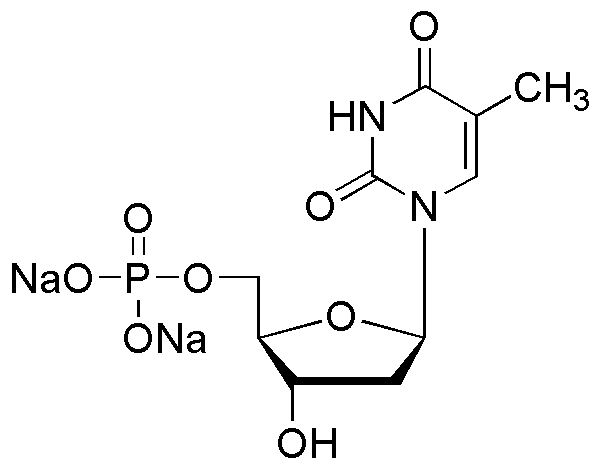2'-Deoxythymidine-5'-monophosphate disodium salt is widely utilized in research focused on:
- DNA Synthesis: This compound is essential for synthesizing DNA in vitro, making it invaluable for genetic research and biotechnology applications.
- Pharmaceutical Development: It serves as a building block in the development of antiviral and anticancer drugs, aiding in the design of therapies that target DNA replication.
- Gene Therapy: Researchers use it to deliver genetic material into cells, facilitating the study of gene function and the development of gene-editing technologies.
- Diagnostic Tools: This compound is employed in the creation of assays and diagnostic kits for detecting viral infections, enhancing the accuracy of medical testing.
- Biochemical Research: It plays a crucial role in studying enzyme activities and metabolic pathways, providing insights into cellular processes and disease mechanisms.
General Information
Properties
Safety and Regulations
Applications
2'-Deoxythymidine-5'-monophosphate disodium salt is widely utilized in research focused on:
- DNA Synthesis: This compound is essential for synthesizing DNA in vitro, making it invaluable for genetic research and biotechnology applications.
- Pharmaceutical Development: It serves as a building block in the development of antiviral and anticancer drugs, aiding in the design of therapies that target DNA replication.
- Gene Therapy: Researchers use it to deliver genetic material into cells, facilitating the study of gene function and the development of gene-editing technologies.
- Diagnostic Tools: This compound is employed in the creation of assays and diagnostic kits for detecting viral infections, enhancing the accuracy of medical testing.
- Biochemical Research: It plays a crucial role in studying enzyme activities and metabolic pathways, providing insights into cellular processes and disease mechanisms.
Documents
Safety Data Sheets (SDS)
The SDS provides comprehensive safety information on handling, storage, and disposal of the product.
Product Specification (PS)
The PS provides a comprehensive breakdown of the product’s properties, including chemical composition, physical state, purity, and storage requirements. It also details acceptable quality ranges and the product's intended applications.
Certificates of Analysis (COA)
Search for Certificates of Analysis (COA) by entering the products Lot Number. Lot and Batch Numbers can be found on a product’s label following the words ‘Lot’ or ‘Batch’.
Numéro de catalogue
Numéro de lot/série
Certificates Of Origin (COO)
This COO confirms the country where the product was manufactured, and also details the materials and components used in it and whether it is derived from natural, synthetic, or other specific sources. This certificate may be required for customs, trade, and regulatory compliance.
Numéro de catalogue
Numéro de lot/série
Safety Data Sheets (SDS)
The SDS provides comprehensive safety information on handling, storage, and disposal of the product.
DownloadProduct Specification (PS)
The PS provides a comprehensive breakdown of the product’s properties, including chemical composition, physical state, purity, and storage requirements. It also details acceptable quality ranges and the product's intended applications.
DownloadCertificates of Analysis (COA)
Search for Certificates of Analysis (COA) by entering the products Lot Number. Lot and Batch Numbers can be found on a product’s label following the words ‘Lot’ or ‘Batch’.
Numéro de catalogue
Numéro de lot/série
Certificates Of Origin (COO)
This COO confirms the country where the product was manufactured, and also details the materials and components used in it and whether it is derived from natural, synthetic, or other specific sources. This certificate may be required for customs, trade, and regulatory compliance.


